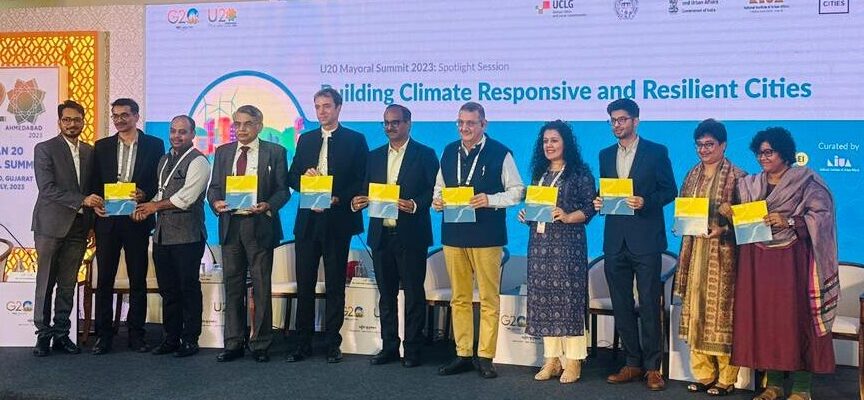Experts Weigh in on Key Factors for Building Climate-Resilient Cities in Urban 20 Session

The National Institute of Urban Affairs (NIUA) and ICLEI South Asia jointly organised a plenary and panel discussion as a parallel event during the Urban 20 (U20) Mayoral Summit in Ahmedabad on 8 July 2023. The focus of the event was “Building Climate Responsive and Resilient Cities”, signifying the need to prioritise sustainable infrastructure, sustainable energy, and resilient urban planning to safeguard communities from climate-related impacts.
Dr Jonathan Demenge, Head of Cooperation at the Swiss Agency of Development and Cooperation (SDC), in his special remarks, said that sustainability cannot be achieved without coexistence, cooperation and equity, and that local actions, specifically in urban areas, are critical for achieving climate targets. A business-as-usual approach is not an option, he added, as more focused and responsible use of limited resources is required, in accordance with the U20 motto of ‘One Planet, One Family, One Future’.
In his keynote address, Dr P S N Rao, Professor, School of Planning and Architecture (SPA), Delhi, stated that while cities must strive to be resilient, this was easier said than done, particularly in India due to its diverse set of problems and conditions. Around 15% of the country’s population lives in coastal regions, making these areas highly vulnerable to climate impacts and deserving of special attention from decision-makers. The hilly regions are home to 4% of India’s population, and research indicates that this number is growing, putting stress on the limited resource base of these areas. Rapid urbanization and climate change is also impacting ecosystems and biodiversity, which need focused adaptation plans. Prof Rao said that while many entrepreneurs are launching climate impact mitigation projects, the country will also need plans that focus on sustainable cooling. Urban flooding has also been causing huge economic losses, and cities need to improve drainage and stormwater management, for which skilled workforce is a pre-requisite.
Dr Sayli Mankikar, Director, Policy and Partnerships, C-Cube, NIUA, highlighted that while there are several reports on cities’ climate actions, a comprehensive report that explains the same in an easy-to-understand language is needed for the common citizen. To this end, NIUA and ICLEI South Asia have jointly developed the “State of Cities: Towards Low Carbon and Resilient Pathways” report, which was launched during the session. This graphical report highlights how opportunities for climate action in Indian cities are being enabled through policy actions such as the Climate Smart Cities Framework. The report features climate data and interventions from 15 Indian cities at the forefront of climate efforts at the local level, including insights from GHG emissions inventories, supported by ICLEI South Asia, and climate actions undertaken by the cities.
ICLEI South Asia has also supported the Ahmedabad Municipal Corporation, under the SDC-supported CapaCITIES project, for developing the city’s “Climate Resilient City Action Plan (CRCAP): Towards a Net Zero Future”. The CRCAP was launched by Gujarat Chief Minister Bhupendrabhai Patel in another event held on 7 July 2023, under the aegis of the U20 Mayoral Summit.
In her presentation on the CRCAP at the plenary session on 8 July, Ms Soumya Chaturvedula, Deputy Director, ICLEI South Asia, spoke about its key elements such as the greenhouse gas (GHG) emissions inventory, and urban system vulnerability and scenario planning for future GHG emission reduction strategies. The plan estimates emissions reduction of 75.9% over business-as-usual (BAU) projections through progressive actions that are in line with national and state policies, and emission reduction of 91% vis-à-vis BAU projections through the Net Zero Pathway. Ms Chaturvedula said that while cities are taking actions, they must be provided with action plans to help align their municipal budgets for a greener economy. Ahmedabad’s Net Zero Climate Action Plan has sector-wise strategies that are necessary for cities to become Net Zero by 2070.
Following the plenary session, a panel discussion highlighted approaches to building climate-resilient cities. Mr Rahul Agnihotri, Advisor, Clean Cooling Solutions and Building Energy Efficiency, United Nations Environment, said that while the Government of India has prepared the Energy Conservation Building Code, more efforts were needed to address gaps in setting up institutions that can identify city-specific actions. He added that the unplanned expansion of cities and growing building stock was a threat to their overall sustainability.
Professor Chetan Vaidya, former Director, SPA, and former Director, NIUA, noted that there was a strong need to integrate climate-resilient actions in the Master Plans of cities. He highlighted a few innovative initiatives such as floating solar, green mobility zones, urban forests, bio-CNG and community solar plants that he had observed being implemented in cities through the CapaCITIES project.
Local bodies in Sri Lanka are not seen as key actors in climate action, Ms. Hemanthi Goonasekera, CEO, Federation of Sri Lankan Local Government Authorities, said, adding that most of the relevant policies are being framed at the central level, with limited participation by local bodies. She emphasised that empowering local bodies was the first step for taking climate actions and that Sri Lanka was lagging in this respect.
The experts also highlighted the importance of innovation and finance for achieving climate resilience. Actions like the use of the Internet of Things for flood detection and temperature sensors for dealing with heatwaves are critical. The innovative concept of a building passport, which has all data and information about a building, can help to reduce building emissions with a mapping of its life cycle. The discussion also focused on the need to monetise actions taken for solid waste and wastewater management.